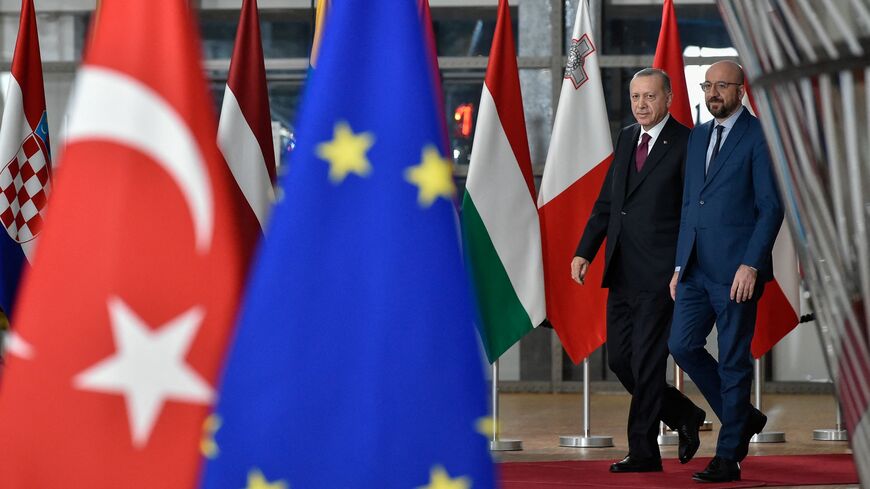ANKARA — Turkish President Recep Tayyip Erdogan’s surprising push to revamp his country’s stalled European Union accession bid may lead to some progress, but European leaders will ultimately be deterred by Ankara's democratic backsliding, experts told Al-Monitor.
At the NATO summit in Vilnius on Monday, Erdogan reversed course by dropping his country’s objection to the Swedish bid to join the alliance. The move came after Stockholm pledged to “actively support efforts” to revive Turkey’s accession negotiations to the EU, modernize the customs union treaty between Turkey and the bloc and allow visa free travel for Turkey to member countries. Sweden also made other promises to Turkey in a seven-point memo.
In line with its founding father Mustafa Kemal Ataturk’s vision, Turkey had historically positioned itself as a part of the Europe. And it made its bid to join the European club in 1959 by applying to what was then the European Economic Community, merely two years after its inception
However, few observers are optimistic that Erdogan's efforts will alter the nature of the ties between Ankara and Brussels, which have deteriorated steadily over the past years over Turkey’s democratic backsliding and human rights record.
Serhat Guvenc, professor of international relations at Istanbul's Kadir Has University, said Erdogan surprised everyone by jump-starting Turkey’s EU bid.
“Yet I don't think [the government] is ready to live up to the transformation this effort entails at home,” Guvenc told Al-Monitor. He said to revive the membership talks, Ankara would have to implement several steps, including overhauling its counterterrorism laws. Guvenc said such a move would be seen as capitulating by Erdogan's government.
Erosion of rule of law, fundamental rights and independence of the judiciary — as well as controversial foreign policies in Syria, Libya and the eastern Mediterranean — prompted the EU to announce that Turkey's full membership negotiations with the bloc had come to a “standstill” in 2018.
A renewed effort and economic woes
Although Turkish officials kept paying lip service to Erdogan's commitment to the EU bid in the lead up to the general elections in May, they have done little to assuage EU concerns.
So, why has Erdogan suddenly decided to give it another push?
With Turkey facing an acute financial crisis and foreign currency crunch, Erdogan's government is scrambling to draw international funds to the country. As part of his first regional tour since his reelection in May, Erdogan will travel to Gulf countries on Monday mainly to secure much-needed funds. The revitalized EU bid may have been driven by a similar motivation.
“The government’s priority right now is to recover the economy. One of the ways to do that is to progress the modernization of the Customs Union,” Guvenc said.
Accepting a long-held Turkish demand, the European Council in 2016 decided to initiate formal negotiations to modernize the Customs Union Treaty between the EU and Ankara. The negotiations have yielded no concrete outcome yet. The bloc halted the talks in 2018 over escalating tensions between Turkey and EU members Greece and Cyprus, but in 2020, the European Council — the bloc’s decision-making body — greenlighted the resumption of the talks on condition that Turkey restores good ties with its neighbors. But Ankara’s exploration and drilling activities in contested waters in the eastern Mediterranean further escalated the tensions in the same year.
According to Guvenc, the resumption of confidence-building talks between Turkey and Greece, along with Ankara’s suspension of its drilling activities in contested waters in the Eastern Mediterranean, could help the customs talks speed up.
Indeed, following Erdogan’s meetings with European Council President Charles Michel and European Commission President Ursula von der Leyen on the sidelines of the summit earlier this week, EU foreign ministers are set to discuss Turkey next Thursday. After his meeting with Erdogan, Michel announced that he instructed the European Commission to lay out a report “with a view to proceed in a strategic and forward-looking manner.”
The total trade volume between Turkey and the EU reached $196.4 billion last year, while Turkey exported more than $103 billion of goods to EU countries, according to the Turkish Ministry of Trade. As Turkey’s top trading partner, modernization of the Customs Union Treaty with the EU could provide a major boost for Turkey’s beleaguered economy.
Will the political cudgel work?
Negotiations over visa free travel for Turkish nationals and modernization of the Customs Union Treaty came to the forefront after a deal Turkey struck with the EU in 2016 that effectively prevented a mass influx of Syrian refugees to Europe, by providing funding to Ankara in the amount of 6 billion euros ($6.7 billion) toward expenses for the more than 3.5 million Syrians living in the country.
Becoming a political cudgel, Erdogan has often threatened to scrap the 2016 deal whenever tensions between Ankara and Brussels spiked. At the peak of the tensions in March 2020, Erdogan had announced his country would no longer block migrants’ passage to Europe, prompting tens of thousands of asylum-seekers to amass in Turkey’s land and sea borders with Greece. The European Parliament approved nearly €500 million ($562 million) additional funding in July.
At a time when EU countries are rejecting visa applications of Turkish citizens citing increasing asylum-seeking applications from Turkey, visa free travel seems like a tall prospect. Yet Ankara’s path to an updated Customs Unions is also not that smooth.
According to Sinan Ulgen, a former Turkish diplomat and senior fellow at Carnegie Europe in Brussels, Ankara needs to restore the rule of law and other basic democratic criteria that earned Turkey formal candidate status in 2005, to achieve any progress in talks with the EU about visa liberalization, Customs Union or full membership negotiations.
"The first step should be Turkey's compliance with the ECHR’s rulings,” Ulgen said, using the acronym of Europe’s top human rights court, the European Court of Human Rights. Defying relevant court rulings, Turkish authorities are keeping several human rights activists and politicians in prison. The Council of Europe — a Pan-European body separate from the European Union — initiated rarely used infringement proceedings against Turkey in 2021 over Ankara’s failure to release businessman and philanthropist Osman Kavala despite the ECHR’s judgment ordering his immediate release. Kavala, 65, has been behind bars since 2017 on charges that were widely criticized by international civic groups and Western capitals. Turkey now risks suspension of its membership at the council.
“It is not realistic to expect any nontransactional progress in Turkey’s ties with the EU without settling the ongoing process in the Council of Europe” Ulgen said, adding that practices that target free speech should be abandoned. Thousands of people in Turkey, including hundreds of journalists, have faced trials and have been imprisoned for voicing dissent over the past decade.
Erdogan, in turn, doesn’t believe his country has any shortcomings in terms of democracy. “There is no problem in Turkey regarding democracy, rights and freedoms.” Erdogan told reporters in a press conference at the end of the NATO summit on Wednesday. “We have no shortcomings when it comes to democracy and rights and freedoms.”
A journey of more than a half century
Turkey’s tumultuous bid to join the European club harks back to 1959 when it had applied to what was then the European Economic Community. The country's bid faced several setbacks in the following years, including military coups that had shook the country in almost every decade and the Turkish 1974 military incursion in Cyprus. The new push came in 1987 when Ankara formally applied for full membership to the European Economic Community. Joint Parliamentary Committee talks began the following year and the European Council granted a formal candidate status to the Turkish nation in 1999.
Ironically, Turkey-EU ties were unprecedentedly robust during Erdogan’s first years in power thanks to successive political reforms that were passed by the ruling Justice and Development Party (AKP). In 2005, the bloc started full membership negotiations with Turkey.
What slowed down the momentum was reciprocal: European powerhouses including France and Germany have never dropped their objections to Turkey’s EU bid and the AKP’s drift away from the political reform agenda. Greek Cyprus’ EU membership in 2004 has further complicated the efforts. After guaranteeing their accession to the bloc before a historical popular vote aiming to reunify ethnically divided island, Greek Cypriots overwhelmingly vetoed the referendum. While Greek Cyprus became an EU member in 2004, Turkish Cyprus is only recognized by Ankara.
The ties began to seriously deteriorate after the late 2010s. Embroiled in a row with a former ally, the US-based Sunni cleric Fethullah Gulen’s and his followers, Erdogan turned to nationalists to form a new political alliance that would keep him in power. Following the end of the peace process in 2015 with the Kurdish militants fighting for self-rule inside Turkey, the government launched a heavy crackdown against the dissent.
The 2016 coup attempt sent relations to rock bottom. While EU capitals were lambasting Turkey’s extension of post-coup attempt crackdown from putschists to journalists, dissidents and intellectuals, Ankara was livid at Brussels over the tepid response that the EU gave in the face of an attempt aiming to overthrow the country’s democratically elected government.








